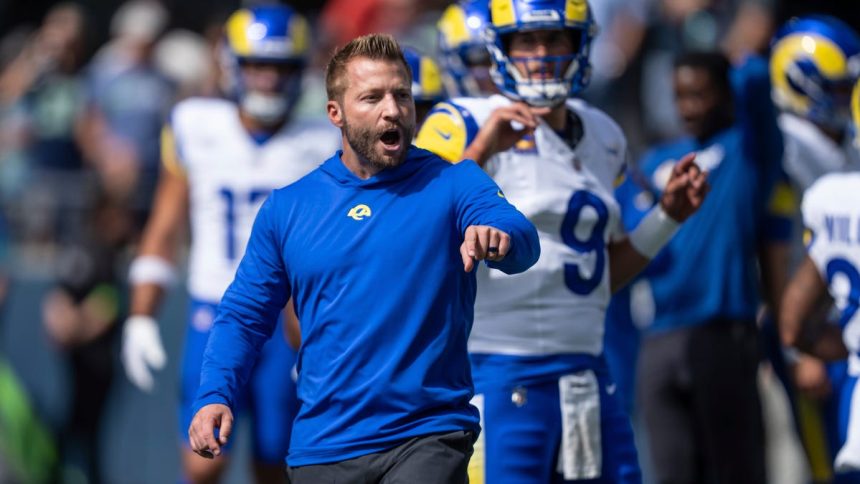The San Francisco 49ers had the game in the bag. They were up 10 with just over 90 seconds left in the game. The Cooper Kupp-less Rams didn’t replicate the offense that led them to a Super Bowl two seasons ago, and wouldn’t score quickly enough to find another drive beyond the one that began with 1:34 remaining in the contest.
So as Los Angeles drove down the field, and the clock wound down, the Rams decided to kick a field goal as time expired to bring the game to its final 7-point differential. That decision flipped the game in the Rams’ directions with bettors and the -7.5-point line in favor of San Francisco. In reality, the kick was meaningless. For those who bet on the game, it made the world of difference. That begs the question — why did Sean McVay call for it instead of having his QB throw one into the end zone?
There are some theories floating around as to why McVay chose to kick the FG. First, was it just to get his kicker practice? That’s a stupid theory because Brett Maher needing one more rep from 38 yards, after being in the NFL for a decade, is ridiculous. It’s different in a game? Alright, guess your practices suck then. That could be why Los Angeles went from champions last February to sucking ever since. Not to mention, it was 2nd-and-10 when they attempted the kick. What coach not under game-tying, or game-winning circumstances, would call that move? Just to get within a touchdown and make the result look more favorable? If it’s a 38-yard field goal, you’re on the 21-yard line. You don’t trust Matthew Stafford to get you into the end zone? He could’ve connected with Puka Nacua for a 16th time against the 49ers.
Whether McVay knew a made field goal would cover the spread, flipping the winning bet with a meaningless field goal is a prime example of one of the several problems with professional leagues being in bed with the sports gambling industry. This wasn’t quite as conspiratorial as script writers detailing the NFL season before it began, which CBS has turned into a commercial during its Sunday broadcasts, but it is suspect. Betting on games has become more rampant in the NFL in recent years, evidenced by Broncos’ defensive lineman Eyioma Uwazurike’s suspension, while the league is doubling and tripling down on its usage.
How much different does a 10-point loss look compared to a 7-point defeat? Calling it a touchdown loss compared to a double-digit one sounds a smidge better in the press. Beyond that, it doesn’t move the needle at all. You think the Commanders care how many they won by yesterday? They survived by the skin of their teeth. But they’re 2-0. That’s all Ron Rivera should care about. He shouldn’t care that his team nearly blew it on a fluky Hail Mary. Washington won by 2. No one in that fan base cares how it got to that point now that the team is undefeated through Week 2 for the first time since 2011. And in defeat, McVay’s need to kick a field goal isn’t aligned with that belief, and it’s cringeworthy.
I didn’t bet on the game, and I haven’t bet on an NFL game since Super Bowl XLVIII, which was nearly a decade ago. This isn’t sour grapes. We’re in a world where sports gambling and professional leagues are tied at the hip. One benefits from the other. And the Rams converting a rare field goal to end the game that doesn’t tie it or win it is mind-boggling. The execution of it might have been as as innocent as lessening deficit of defeat. The domino effect is much larger.









